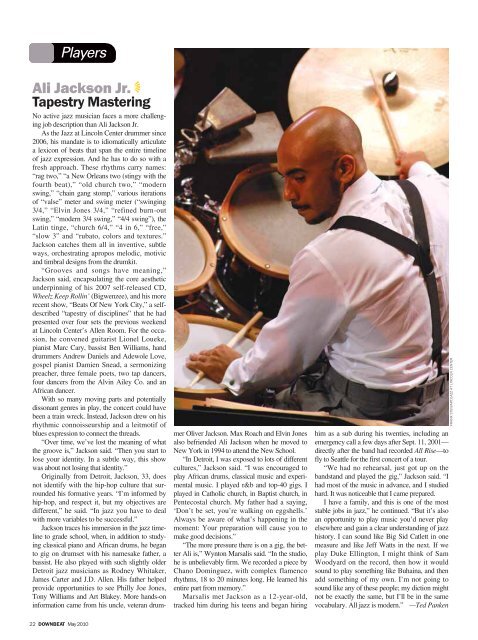Download - Downbeat
Download - Downbeat
Download - Downbeat
- No tags were found...
You also want an ePaper? Increase the reach of your titles
YUMPU automatically turns print PDFs into web optimized ePapers that Google loves.
PlayersAli Jackson Jr. ;Tapestry MasteringNo active jazz musician faces a more challengingjob description than Ali Jackson Jr.As the Jazz at Lincoln Center drummer since2006, his mandate is to idiomatically articulatea lexicon of beats that span the entire timelineof jazz expression. And he has to do so with afresh approach. These rhythms carry names:“rag two,” “a New Orleans two (stingy with thefourth beat),” “old church two,” “modernswing,” “chain gang stomp,” various iterationsof “valse” meter and swing meter (“swinging3/4,” “Elvin Jones 3/4,” “refined burn-outswing,” “modern 3/4 swing,” “4/4 swing”), theLatin tinge, “church 6/4,” “4 in 6,” “free,”“slow 3” and “rubato, colors and textures.”Jackson catches them all in inventive, subtleways, orchestrating apropos melodic, motivicand timbral designs from the drumkit.“Grooves and songs have meaning,”Jackson said, encapsulating the core aestheticunderpinning of his 2007 self-released CD,Wheelz Keep Rollin’ (Bigwenzee), and his morerecent show, “Beats Of New York City,” a selfdescribed“tapestry of disciplines” that he hadpresented over four sets the previous weekendat Lincoln Center’s Allen Room. For the occasion,he convened guitarist Lionel Loueke,pianist Marc Cary, bassist Ben Williams, handdrummers Andrew Daniels and Adewole Love,gospel pianist Damien Snead, a sermonizingpreacher, three female poets, two tap dancers,four dancers from the Alvin Ailey Co. and anAfrican dancer.With so many moving parts and potentiallydissonant genres in play, the concert could havebeen a train wreck. Instead, Jackson drew on hisrhythmic connoisseurship and a leitmotif ofblues expression to connect the threads.“Over time, we’ve lost the meaning of whatthe groove is,” Jackson said. “Then you start tolose your identity. In a subtle way, this showwas about not losing that identity.”Originally from Detroit, Jackson, 33, doesnot identify with the hip-hop culture that surroundedhis formative years. “I’m informed byhip-hop, and respect it, but my objectives aredifferent,” he said. “In jazz you have to dealwith more variables to be successful.”Jackson traces his immersion in the jazz timelineto grade school, when, in addition to studyingclassical piano and African drums, he beganto gig on drumset with his namesake father, abassist. He also played with such slightly olderDetroit jazz musicians as Rodney Whitaker,James Carter and J.D. Allen. His father helpedprovide opportunities to see Philly Joe Jones,Tony Williams and Art Blakey. More hands-oninformation came from his uncle, veteran drummerOliver Jackson. Max Roach and Elvin Jonesalso befriended Ali Jackson when he moved toNew York in 1994 to attend the New School.“In Detroit, I was exposed to lots of differentcultures,” Jackson said. “I was encouraged toplay African drums, classical music and experimentalmusic. I played r&b and top-40 gigs. Iplayed in Catholic church, in Baptist church, inPentecostal church. My father had a saying,‘Don’t be set, you’re walking on eggshells.’Always be aware of what’s happening in themoment: Your preparation will cause you tomake good decisions.”“The more pressure there is on a gig, the betterAli is,” Wynton Marsalis said. “In the studio,he is unbelievably firm. We recorded a piece byChano Dominguez, with complex flamencorhythms, 18 to 20 minutes long. He learned hisentire part from memory.”Marsalis met Jackson as a 12-year-old,tracked him during his teens and began hiringhim as a sub during his twenties, including anemergency call a few days after Sept. 11, 2001—directly after the band had recorded All Rise—tofly to Seattle for the first concert of a tour.“We had no rehearsal, just got up on thebandstand and played the gig,” Jackson said. “Ihad most of the music in advance, and I studiedhard. It was noticeable that I came prepared.I have a family, and this is one of the moststable jobs in jazz,” he continued. “But it’s alsoan opportunity to play music you’d never playelsewhere and gain a clear understanding of jazzhistory. I can sound like Big Sid Catlett in onemeasure and like Jeff Watts in the next. If weplay Duke Ellington, I might think of SamWoodyard on the record, then how it wouldsound to play something like Buhaina, and thenadd something of my own. I’m not going tosound like any of these people; my diction mightnot be exactly the same, but I’ll be in the samevocabulary. All jazz is modern.” —Ted PankenFRANK STEWART/JAZZ AT LINCOLN CENTER22 DOWNBEAT May 2010
















